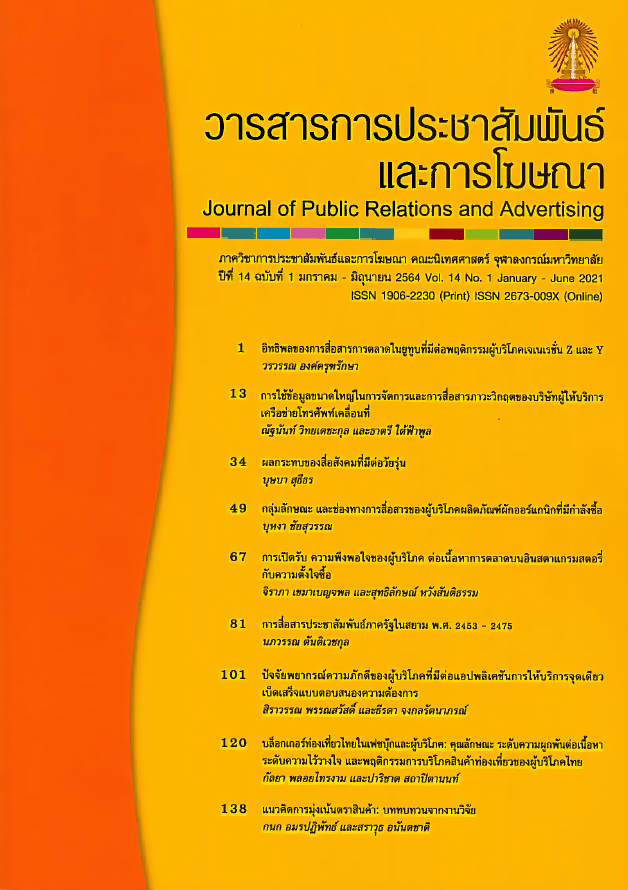Clusters and Communications Channel Usage of Affluent Organic Product Consumers
Main Article Content
Abstract
This study aims to examine the decision-making factors that impact the choices made by organic product consumers. Using cluster analysis consumers were categorized based on the organic product consumption characteristics and communications channel usage. The study was conducted using quantitative research methodology utilizing a structured questionnaire for data collection. Data was collected from 400 respondents, who are organic product consumers in the Bangkok area.
Factor analysis was used to identify four factors that affected the decision-making, which are marketing communications, impact on the environment, animals, and food, social norms, and nutrition and food value. The consumers have been categorized in three groups using the K-means cluster analysis. The three groups are – health conscious and interested in marketing communications group; convenience and understand in benefits group; and elderly, who are concerned about quality, family, and health. The three groups receive information about organic products from the farmers, packaging/label, mass media, product exhibitions/fairs, and point-of-purchase materials.
Article Details
References
กนกอร นิลวรรณจะณกุล และปวีณา คำพุกกะ. (2556). ความรู้และทัศนคติที่มีอิทธิพลต่อพฤติกรรมการซื้อสินค้าที่เป็นมิตรต่อสิ่งแวดล้อม ของผู้บริโภคภาคตะวันออกเฉียงเหนือ. วารสารบริหารศาสตร์ มหาวิทยาลัยอุบลราชธานี, 2(3), 65-83.
คณะกรรมการพัฒนาเกษตรอินทรีย์แห่งชาติ. (2560). ยุทธศาสตร์การพัฒนาเกษตรอินทรีย์แห่งชาติ (พ.ศ.2560-2564). กรุงเทพฯ: สำนักงานเศรษฐกิจการเกษตร. วันที่เข้าถึงข้อมูล 20 กรกฎาคม 2563 แหล่งที่มา http://planning.dld.go.th/th/images/stories/section-5/2560/strategy11.pdf.
จารุพร มีทรัพย์ทอง. (2561). ปัจจัยที่มีความสัมพันธ์ต่อพฤติกรรมการตัดสินใจเลือกซื้อสินค้าที่เป็นมิตรกับสิ่งแวดล้อมของผู้บริโภคชาวไทยและผู้บริโภคชาวลาวในจังหวัดเลย. วารสารธุรกิจปริทัศน์, 10(2), 177-196
จิตราภา บุญญานุสนธิ์. (2558). ความต้องการซื้อสินค้าธัญพืชประเภทข้าวอินทรีย์ (วิทยานิพนธ์ปริญญามหาบัณฑิต ไม่ได้ตีพิมพ์), มหาวิทยาลัยเทคโนโลยีสุรนารี, นครราชสีมา.
ชยาพร วัฒนศิริ และคณะ. (2553). การวิเคราะห์ปัจจัยความสำเร็จของผักเกษตรอินทรีย์ (รายงานการวิจัย). นนทบุรี: มหาวิทยาลัยสุโขทัยธรรมาธิราช.
ชัญญา ชีนิมิตร และพัชนี เชยจรรยา. (2559). ปัจจัยที่มีผลต่อการตัดสินใจซื้ออาหารออร์แกนิกออนไลน์ของผู้บริโภค. วารสารการสื่อสารและการจัดการ นิด้า, 2(3), 1-11.
ณัฐกนก รัตนางกูร. (2552). การศึกษาปัจจัยทางการตลาดที่มีอิทธิพลต่อการตัดสินใจเลือกซื้อสินค้าที่เป็นมิตรกับสิ่งแวดล้อมของผู้บริโภคในเขตกรุงเทพมหานคร (การค้นคว้าอิสระปริญญามหาบัณฑิต ไม่ได้ตีพิมพ์), มหาวิทยาลัยกรุงเทพ, กรุงเทพฯ.
ณัฐวจี เขียวลือ. (2560). นโยบายการส่งเสริมเกษตรอินทรีย์ในพื้นที่เกาะพะงัน จังหวัดสุราษฎร์ธานี (วิทยานิพนธ์ปริญญามหาบัณฑิต ไม่ได้ตีพิมพ์), จุฬาลงกรณ์มหาวิทยาลัย, กรุงเทพฯ.
ณัฐวุฒิ เลิศวัฒนเกษม. (2558). ปัจจัยที่มีอิทธิพลต่อความตั้งใจซื้ออาหารเพื่อสุขภาพของผู้บริโภคในกรุงเทพมหานคร (การค้นคว้าอิสระปริญญามหาบัณฑิต ไม่ได้ตีพิมพ์), มหาวิทยาลัยกรุงเทพ, กรุงเทพฯ.
ทานตะวัน ตันติทวีวัฒนา. (2558). ปัจจัยที่มีความสัมพันธ์และมีอิทธิพลเชิงบวกต่อความตั้งใจซื้ออาหารเพื่อสุขภาพของผู้บริโภคในกรุงเทพมหานคร (การค้นคว้าอิสระปริญญามหาบัณฑิต ไม่ได้ตีพิมพ์), มหาวิทยาลัยกรุงเทพ, กรุงเทพฯ.
ปิลันธนา แป้นปลื้ม และมณฑิชา พุทซาคํา. (2556). พฤติกรรมผู้บริโภคในการซื้อสินค้าเกษตรอินทรีย์: กรณีศึกษาผู้บริโภคในเขตกรุงเทพมหานครและปริมณฑล (รายงานการวิจัย). กรุงเทพฯ: สำนักงานคณะกรรมการวิจัยแห่งชาติ.
รฐา สื่อเฉย, ฌาตินนท์ กาญจนพิบูลย์ และสุนีย์ วรรธนโกมล. (2560). ปัจจัยที่ส่งผลต่อการตัดสินใจซื้อผักไฮโดรโปนิกส์ของผู้บริโภคในกรุงเทพมหานคร. วารสารวิทยาการจัดการปริทัศน์, 19(2), 82-91.
รัตนา สีดี. (2561). ความตั้งใจที่จะซื้ออาหารอินทรีย์ของผู้บริโภคในประเทศไทย. วารสารบัณฑิตศึกษา มหาวิทยาลัยราชภัฏวไลยอลงกรณ์ ในพระบรมราชูปถัมภ์, 12(3), 134-146
วิเชียร เกตุสิงห์. (2537). การวิจัยเชิงปฏิบัติ: คู่มือการวิจัย (พิมพ์ครั้งที่ 2). นนทบุรี: ม.ป.พ.
วิภาวี กลำบุตร. (2553). ทัศนคติและการคล้อยตามกลุ่มอ้างอิงของผู้บริโภคเจเนอเรชั่นวาย (Generation Y) ในเขตกรุงเทพมหานคร ที่ส่งผลต่อความตั้งใจจะซื้อสินค้าเพื่อสิ่งแวดล้อม (วิทยานิพนธ์ปริญญามหาบัณฑิต ไม่ได้ตีพิมพ์), มหาวิทยาลัยธรรมศาสตร์, กรุงเทพฯ.
ศูนย์วิจัยกสิกรไทย. (2561). ตลาดออร์แกนิกธุรกิจสร้างเงิน SME ไทย. วันที่เข้าถึงข้อมูล 13 กรกฎาคม 2563 แหล่งที่มา https://kasikornbank.com/th/business/sme/KSMEKnowledge/article/KSMEAnalysis/Documents/Thai-SME_Organic-Product.pdf
สมเกียรติ วงศ์ประเสริฐ. (2560). ทัศนคติต่อสินค้าอาหารอินทรีย์ของผู้บริโภคในเขตกรุงเทพ (วิทยานิพนธ์ปริญญามหาบัณฑิต ไม่ได้ตีพิมพ์), มหาวิทยาลัยธรรมศาสตร์, กรุงเทพฯ.
สมศักดิ์ รอดลอย. (2558). รูปแบบการดำเนินชีวิต การรับรู้ข่าวสาร และทัศนคติที่ส่งผลต่อพฤติกรรมการบริโภคผักออร์แกนิก (วิทยานิพนธ์ปริญญามหาบัณฑิต ไม่ได้ตีพิมพ์), มหาวิทยาลัยกรุงเทพ, กรุงเทพฯ.
สร้อยสุดา แสงจันทร์. (2560). แนวทางการเพิ่มผลผลิตของผลิตภัณฑ์เกษตรอินทรีย์ (ผักปลอดสารพิษ) ของสมาชิกชุมชนบ้านถ้ำเสือ อำเภอแก่งกระจาน จังหวัดเพชรบุรี (วิทยานิพนธ์ปริญญามหาบัณฑิต, ไม่ได้ตีพิมพ์), มหาวิทยาลัยเทคโนโลยีราชมงคลพระนคร, กรุงเทพฯ.
สัญชาติ คงบัน. (2554). พฤติกรรมการบริโภคผักไฮโดรโปนิกส์ในจังหวัดภูเก็ต (วิทยานิพนธ์ปริญญามหาบัณฑิต, ไม่ได้ตีพิมพ์), มหาวิทยาลัยสุโขทัยธรรมาธิราช, นนทบุรี.
สุภมาส อังศุโชติ, สมถวิล วิจิตรวรรณา, และรัชนีกูล ภิญโญภานุวัฒน์. (2554). สถิติวิเคราะห์สำหรับการวิจัยทางสังคมศาสตร์และพฤติกรรมศาสตร์: เทคนิคการใช้โปรแกรม LISREL. กรุงเทพฯ: เจริญดีมั่นคงการพิมพ์.
อุกฤษฏ์ เอื้อวัฒนสกุล. (2558). ทัศนคติและความเชื่อของครอบครัว ความห่วงใยในสิ่งแวดล้อม การคล้อยตามกลุ่มอ้างอิง และอัตลักษณ์ส่วนบุคคล ที่ส่งผลต่อความตั้งใจซื้อผลิตภัณฑ์อาหารคลีนของผู้บริโภคในกรุงเทพมหานคร (การค้นคว้าอิสระปริญญามหาบัณฑิต ไม่ได้ตีพิมพ์), มหาวิทยาลัยกรุงเทพ, กรุงเทพฯ.
Belch, G. E. (2014). Advertising and promotion: An integrated marketing communications perspective. Vancouver: Langara College.
Caesar, K. K. (2017). Attitudes towards organic fruits and vegetables in Ghana (Unpublished master’s thesis), Ghent University, Ghent, Belgium.
Chen, K. & Deng, T. (2016). Research on the green purchase intentions from the perspective of product knowledge. Sustainability, 8(9), 1-16.
Donahue, M. E. (2017).Theory of planned behavior analysis and organic food consumption of American consumers (Unpublished doctoral dissertation), Walden University, Minneapolis, MN, United States.
Drost, E. (2011). Validity and reliability in social science research. Education Research and Perspectives, 38(1), 105-123.
Eagly, A. H., & Chaiken, S. (1993). The psychology of attitudes. New York: Harcourt Brace Jovanovich.
Eide, B., & Toft, M. (2013). Consumer behavior theories–purchasing organic food (Unpublished bachelor’s Thesis), Aarhus University, Aarhus, Denmark.
Kotler, P. (2009). Marketing management (13th ed.). New Jersey: Prentice-Hall, Englewood Cliffs.
Lian, S. B. (2017). What motivates consumers to purchase organic food in Malaysia? Asian Social Science, 13(9), 100-109. doi: 10.5539/ass.v13n9p100
Lotter, D. W. (2003). Organic agriculture. Journal of Sustainable Agriculture, 21(4), 59-128. doi: 10.1300/J064v21n04_06
Mowen, J. C. (1993). Consumer behavior (3rd ed.). New York: Macmillan Publishing Company.
Nguyen, A. (2016). Organic food buying behavior of low income consumers with high education: Focus on student in Turku (Unpublished bachelor’s thesis), Turku University of Applied Sciences, Turku, Finland.
Ozguven, N. (2012). Organic foods motivations factors for consumers. Procedia-Social and Behavioral Sciences, 62, 661-665.
Schiffman, L. G., Wisenblit, J., & Kumar, S. R. (2018). Consumer behavior (12th ed.). India: Pearson Education India.
Stern, P. C. (2000). New environmental theories: Toward a coherent theory of environmentally significant behavior. Journal of Social Issues, 56(3), 407-424.
Tsakiridou, E., Boutsouki, C., Zotos, Y., & Mattas, K. (2008). Attitude and behavior towards organic products: an exploratory study. International Journal of Retail & Distribution Management, 36(2), 158-175.
Wee, C. S., Ariff, M. S. B. M., Zakuan, N., Tajudin, M. N. M., Ismail, K., & Ishak, N. (2014). Consumers perception, purchase intention and actual purchase behavior of organic food products. Review of Integrative Business and Economics Research, 3(2), 378-397.
Yaraddi, R., Kulkarni, V., & G. M., Aneesh (2018). Factors influencing consumers to purchase organic food products. Munich: GRIN Verlag.
Yazdanpanah, M. & Forouzani, M. (2015). Application of the theory of planned behaviour to predict Iranian student’ intention to purchase organic food. Journal of Cleaner Production, 107, 342-352. doi: 10.1016/j.jclepro.2015.02.071


